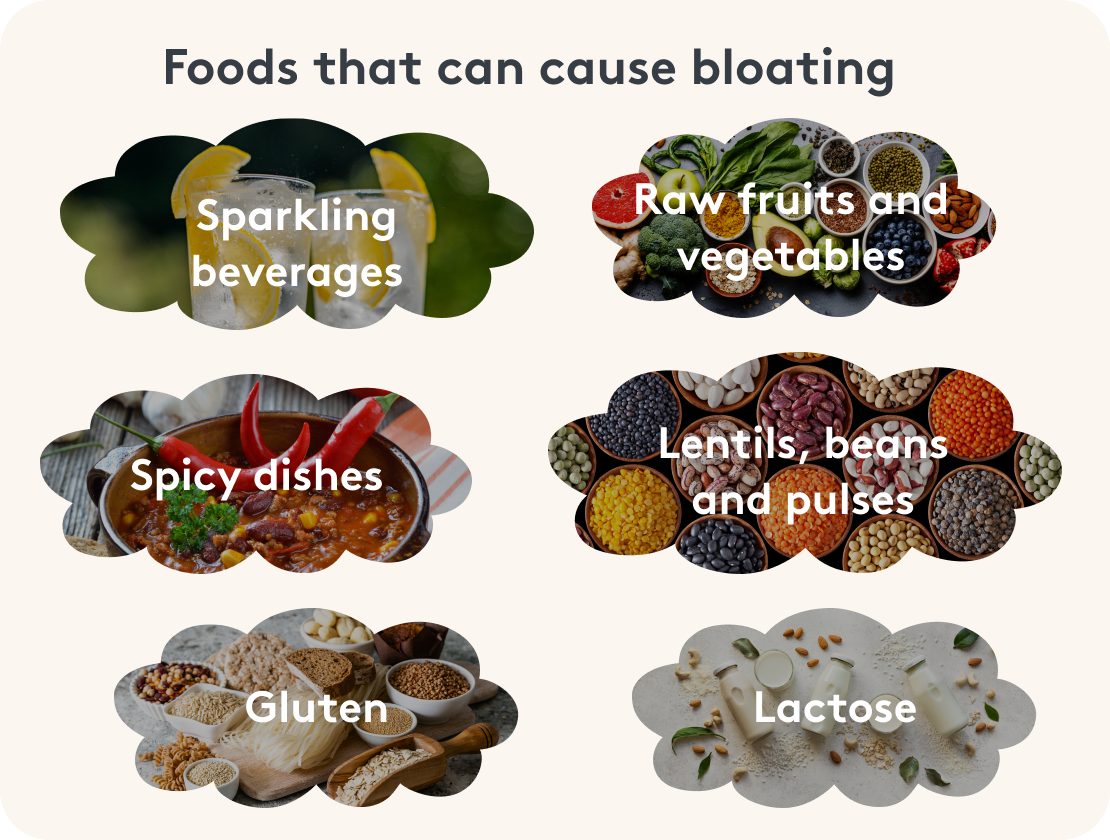Table of contents
- Symptoms: How do I know if I have a bloated stomach?
- Causes: Why do I get a bloated stomach?
- This helps against flatulence: 7 tips against too much air in the stomach
- Home remedies for flatulence: Are there natural remedies for a good stomach feeling?
- Be kind to your belly, bloated or not
- Sources & Bibliography
Themen dieses Blogartikels:
What helps with bloating belly? Six tips for bloating belly problems
Flatulence is unpleasant and can really spoil your mood. In Germany, 13 percent of people complain of bloating.¹ A bloated stomach can manifest itself very differently from person to person. Sometimes the stomach is rather swollen, sometimes it feels as if it is bloated with far too much air. These are the most common symptoms²:
- Big belly filled with air
- Bloating
- Sensitive stomach
- Feeling of fullness or tension
- Pressure in the stomach
- Abdominal pain
- Audible abdominal and bowel noises
- Frequent flatulence and belching
- Digestive complaints
Whether it's after a meal, early in the morning, in the evening, before your period or even permanently, your bloated belly has a cause that you can get to the bottom of. Do you know how such a bloated belly develops and what you can do about it? Find out more in this article.
What does a bloated belly feel like?
Why is your belly bigger than usual from time to time and why does it hurt and pinch? Let's get to the bottom of the various causes that can trigger a bloated belly before we look at possible countermeasures.

stress
If the stresses of everyday life become too great, this has a negative effect on our well-being. It is therefore no wonder that people who are frequently stressed often complain of digestive problems. One of the reasons for this is inner tension, which can disrupt various processes in the gastrointestinal tract.³
Groceries
Your stomach doesn't usually cause any problems, but you still get a bloated stomach from time to time? The most common cause of bloating is the food you eat. Certain foods have a high bloating potential. This means that they can encourage the development of a bloated stomach.
The following foods have a reputation for causing a bloated stomach - especially when raw:⁴
- Pulses and beans
- onions
- Spicy dishes
- Cabbage
- leeks
- garlic
- cabbage
- Celery and peppers


These foods contain valuable nutrients for the body. However, the intestines can only digest them slowly. It is supported by bacteria, which produce a lot of carbon dioxide (CO2) in the process, which causes flatulence. This is why flatulence often occurs when you drink carbonated drinks.⁵
food intolerances
Another cause of a bloated stomach can be food intolerances, for example related to lactose or gluten.
This is what happens with lactose intolerance: Lactose is basically split into two individual components by an enzyme in the intestine. If this enzyme is only present in small quantities or is completely missing , the intestinal bacteria have to step in. Just like with gassy foods, they produce a lot of CO2 and you end up with a salad - or too much gas in your stomach.
Too much sport and exercise
Another reason for flatulence can be excessive exercise in the form of high intensity training and endurance sports or too little exercise.
When you jog, for example, it's not just your legs that move, but also your internal organs. This can cause them to "bum into" each other from time to time and become irritated as a result. This is why digestion is often stimulated after training.
If you notice that this problem occurs often and you have a bloated stomach especially after eating, then it may help if you go jogging first thing in the morning and only eat something after exercise .
intestinal inflammation
Inflammation of the gastrointestinal tract can also cause bloating or swelling in the abdomen. But it usually doesn't stop there, because such inflammations are often accompanied by other symptoms . These include diarrhea, exhaustion, severe pain or nausea.
If you have such gastrointestinal complaints over a longer period of time , you should see a doctor to be on the safe side so that he or she can examine you for inflammation and help you.
dysbiosis and constipation
In addition to inflammation of the gastrointestinal tract, dysbiosis or constipation can lead to flatulence. Dysbiosis ⁶ refers to deviations in the number or ratio of intestinal bacteria. When bacteria proliferate in the wrong places, this is referred to as SIBO (Small Intestinal Bacterial Overgrowth). This creates an imbalance in the intestinal flora .
In addition, other forms of dysbiosis can also be the cause of a bloated stomach. For example, there may be too few bacteria overall or simply the wrong bacteria . The challenge is that dysbiosis such as SIBO is often wrongly diagnosed as irritable bowel syndrome or not recognized at all.
The bloated stomach is caused by the problems mentioned in the gastrointestinal tract, primarily because the food consumed is not digested properly . The bacteria process part of the food and produce CO2, one of the main causes of bloating.
Advertisement
Bring your gut back into balance:
With 15 nutrients & plant substances
Supplemented with vitamin C from acerola
Effective plant substances such as acacia fiber, artichoke, psyllium & linseed
Source of dietary fiber with high fiber content
Effective & noticeably effective
Gluten & lactose free
Developed by doctors

This helps against bloating: 7 tips against too much air in your stomach
You now know the common causes of a bloated belly and are looking for solutions to relieve your bloated belly? Then there are various measures you can try. Below we have collected 7 helpful tips that can be easily integrated into your everyday life.
Tip 1: Keep a bloated stomach journal
A bloated belly journal is the first step in the fight against a bloated belly. It helps you to understand where your bloated belly is coming from. Keeping such a journal is very simple: write it down for a few weeks,
- what you ate,
- what your daily routine was like in terms of stress, exercise and sleep and
- whether you had a bloated belly and how bloated your belly was.
This will make it easier for you to recognize a pattern. Does the bloating often occur after a certain meal or after exercise? Has it mainly occurred when you have eaten late?
Once you have found the suspected culprit, you can try cutting out certain foods or habits that could be the cause. Continue to keep a diary and check how your bloating problem changes in the near future.
Tip 2: Avoid fresh vegetables in the evening
Fresh vegetables are good for the body, but they are quite difficult to digest . Even though salad and the like generally contain many important nutrients that the body needs, eating them can lead to bloating and stomach pain.
If you feel sensitive, try to include the salad in your lunch and eat something warm in the evening instead. It is best to avoid gassy foods that put too much strain on the gastrointestinal tract. These foods include, for example:
- cauliflower
- kohlrabi
- pumpkin
- potatoes
- parsnips
- carrots
- zucchini
- broccoli florets
Tip 3: Pay attention to intolerances
If you experience frequent gastrointestinal complaints and bloating that is noticeably related to your diet, these can be symptoms of various intolerances. It's best to have a professional checkup to determine whether you have a gluten or lactose intolerance , for example. Then you can take more targeted measures to combat the bloated stomach and the associated pain.
Tip 4: Balance your gut with probiotics
In many cases, a bloated stomach can be traced back to problems with the intestinal bacteria. What can help you are probiotics . Probiotic foods contain live, good intestinal bacteria that build up the intestinal environment and can thus facilitate digestion.⁷ The name probiotics comes from the Greek "pro bios" and means "for life".
Tip 5: Feed your gut bacteria
While we're on the subject of intestinal bacteria: these small creatures also need to eat. However, they have different requirements than you. They find fiber particularly tasty - that is, the part of the food that you don't need. Different fibers appeal to different bacteria.
The substances that feed your bacteria and thus serve as a source of food for growth and reproduction are called prebiotics . The word prebiotic can be roughly translated as "prerequisite for life". They promote intestinal health and thus your well-being.
Why is gut health so important? It's simple: the gut is involved in your mood and brain performance , as well as your metabolism . Fiber also promotes the digestion of food in the gastrointestinal tract and can thus prevent constipation or similar complaints and help prevent too much gas from forming in the stomach.
You can find out how the gut and your brain work together in the blog article on gut-brain axis .
Tip 6: Go for a walk
Wait a minute, didn't we say that exercise can cause bloating? It is true that excessive exercise such as jogging, high-intensity interval training, gymnastics or similar exercises can stimulate the intestines. Gentle exercise, on the other hand, has a relaxing effect and can even improve your bloating. These include, for example:
- Yoga for relaxation
- walks in the fresh air
- Gentle stretching exercises
You should also make sure that you do not do intensive training too late in the evening . It is best to avoid intensive training two hours before going to bed and instead prepare yourself for a good night's rest.
Do you have trouble sleeping through the night? In our blog you will find various tips for restful sleep .
Tip 7: Avoid stress
Stress is hard to avoid for many people and is a major factor in almost all physical problems. It is also considered a trigger for bloating:⁷
- For example, a stressful everyday life can cause you to eat frantically in order not to miss your next appointment, which means that your gastrointestinal tract cannot digest food well.
- Stress activates the sympathetic nervous system, which ensures that digestion is put on hold. This leads to symptoms such as abdominal pain, indigestion and flatulence.
So in future, make sure you take your time when eating and avoid distractions during the meal as much as possible.
Home remedies for flatulence: Are there natural remedies for a good stomach feeling?
Are there any over-the-counter herbal remedies for flatulence?
Herbal remedies for flatulence can help your body maintain normal stomach and intestinal function. Alternatively, you can also relieve your flatulence with dietary supplements .
In addition, various tests can give you information about whether you have an intolerance, e.g. histamine intolerance or gluten intolerance.
Everything at a glance on the subject of bloated belly
A bloated belly is nothing to be ashamed of. Rather, it shows you that your body needs attention and would like less stress or variety in your diet. Find out what is causing your bloating and give your body what it needs.
Until you have found the culprit that is plaguing you with bloating, remember: you are still you! And the next time you have a bloated belly, just put on something you feel comfortable in, make yourself as cozy as possible and be kind to your tummy.
This article is based on carefully researched sources:
Sources & Bibliography
- aerzteblatt.de/archiv/functional-intestinal complaints-in-adults-4d157ced-38dd-4c00-8a07-6f8a69570b84
- Wilkinson JM, Cozine EW, Loftus CG. Gas, Bloating, and Belching: Approach to Evaluation and Management. Am Fam Physician. 2019;99(5):301-309.
- Price KR, Lewis J, Wyatt GM, Fenwick GR. Flatulence--causes, relationship to diet and remedies. Food. 1988;32(6):609-626. doi:10.1002/food.19880320626
- bzfe.de/ernaehrung/ernaehrungsberatung/lebensmittelwahl/
- Iovino P, Bucci C, Tremolaterra F, Santonicola A, Chiarioni G. Bloating and functional gastrointestinal disorders: where are we and where are we going?. World J Gastroenterol. 2014;20(39):14407-14419. doi:10.3748/wjg.v20.i39.14407
- Lübbert, C. Bacterial overgrowth of the small intestine. In: Lehnert, H., Märker-Hermann, E., Marx, N., Meyhöfer, SM (eds) DGIM Internal Medicine. 2023. Springer Reference Medicine. Springer, Berlin, Heidelberg.
- Hungin AP, Mulligan C, Pot B, et al. Systematic review: probiotics in the management of lower gastrointestinal symptoms in clinical practice -- an evidence-based international guide. Aliment Pharmacol Ther. 2013;38(8):864-886. doi:10.1111/apt.12460











